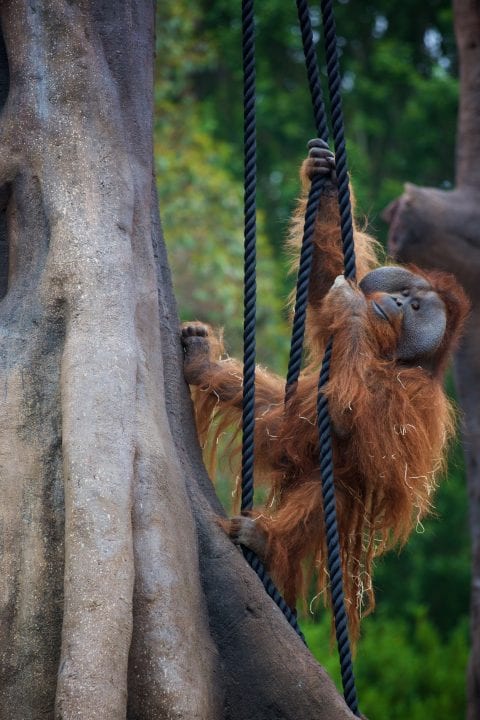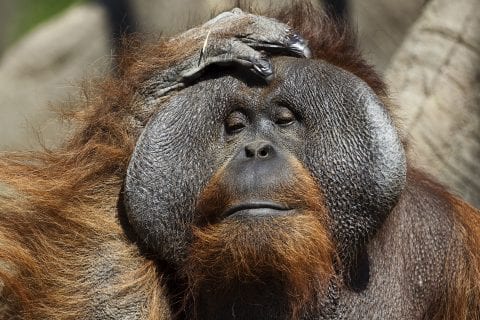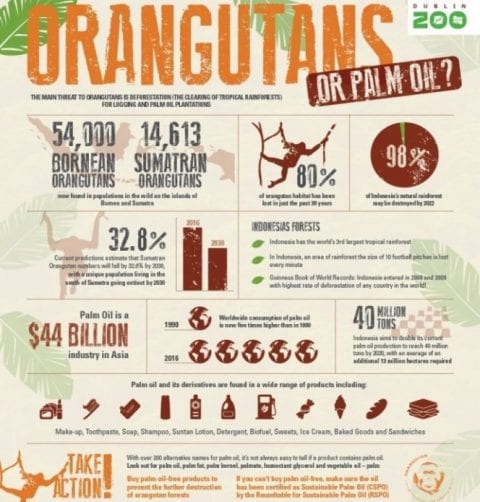Posted In Conservation | 20th September 2018
Reducing the Use of Palm Oil in Dublin Zoo
Palm oil is a type of edible vegetable oil that is derived from the palm fruit, grown on the African oil palm tree. Oil palms are originally from Western Africa, but can flourish wherever there is enough heat and rainfall. Today, palm oil is grown throughout Africa, Asia, North America, and South America, with up to 85% of all palm oil globally produced and exported from Indonesia and Malaysia- home to many animals including orangutans.
What products is palm oil found in?
Palm oil can be found in around half of all packaged supermarket items including margarine, biscuits, bread, breakfast cereal, instant noodles, shampoo, lipstick, candles, detergents, chocolate and ice cream.
With over 200 alternative names for palm oil, it is not always easy to tell if a product contains palm oil. Look out for pal oil, palm fat, palm kernel, palmate, humectant glycerol and vegetable oil – palm.
Why is palm oil so widely used?
Palm oil is one of the world’s most widely used ingredients as it is very efficient in comparison to other vegetable crops. In fact, no other crop can yield even a third as much oil per acre planted. And along with using less land, the oil palm soaks up significantly fewer pesticides and chemical fertilizers than coconut, corn or any other vegetable oil source.
However, it is rapid increase in demand for the world’s cheapest vegetable oil that one of the catalysts of deforestation.

Sibu, a male orangutan living at Dublin Zoo
How is agriculture leading to deforestation?
The quickest, cheapest and, unfortunately, most destructive way of clearing land for agriculture is to burn it. This has devastating consequences for the wildlife living there, driving extinction of some of the world’s most exotic and enigmatic creatures. It also releases enormous amounts of greenhouse gas emissions, in fact, at present Indonesian fires are currently producing more carbon dioxide than the entire US economy.
Not only does this effect the wildlife in the rainforest but it is hugely dangerous for the indigenous people of these regions. As the majority of deforestation happens in developing countries, native communities are often poorly equipped in defending local land from huge multinational corporations. In fact, many of these people are offered employment by these companies and have little choice but to accept these often life-threatening jobs, sometimes working under horrific conditions.
Although palm oil is hugely destructive, it is important to note that the principal reason for deforestation is clearing land for cattle-grazing and soy agriculture that is used to feed said cattle.

Should I buy sustainable palm oil products or palm oil free?
As explained above, oil palm trees are very efficient crops and take up much less land and resources than other crops used for their oils. As such, going palm oil free could be an even less sustainable approach than opting for products that contain sustainable palm oil. As such, boycotting the product may have more destructive consequences.
However, if you are going to buy a product with palm oil in it, choose one for that has been Certified as Sustainable Palm Oil (CSPO) by the Roundtable for Sustainable Palm Oil (RSPO). The Roundtable on Sustainable Palm Oil was established in 2004 with the objective of promoting the growth and use of sustainable oil palm products through credible global standards and engagement of stakeholders.
If there is the option to buy a palm oil free product over a product that contains palm oil from an unsustainable source i.e. with no sustainable labelling, choose palm oil free.
Like most other food products, eating local and unprocessed foods is one of the best ways to avoid palm oil and other unsustainable ingredients.

What is Dublin Zoo doing about palm oil?
In 2016, Dublin Zoo conducted an audit of all products sold in the gift shops, vending machines and restaurants and removed any products not deemed sustainable. Everything sold on the Dublin Zoo grounds is now Certified by RSPO or palm oil free. Other zoos such as Chester Zoo, Paighton Zoo and the professional body for Zoo’s in the UK and Ireland, BIAZA, have the same stance.
Useful Links
- Chester Zoo Sustainable Palm Oil Learning Resources
- ZSL Sustainability Policy Transparency Tool Kit
- Roundtable on Sustainable Palm Oil
- The Guardian – The Palm Oil Debate (and other useful articles and infographics)
- The Rainforest Foundation UK’s palm oil product guide
- WWF Palm Oil buyers’ scorecard

